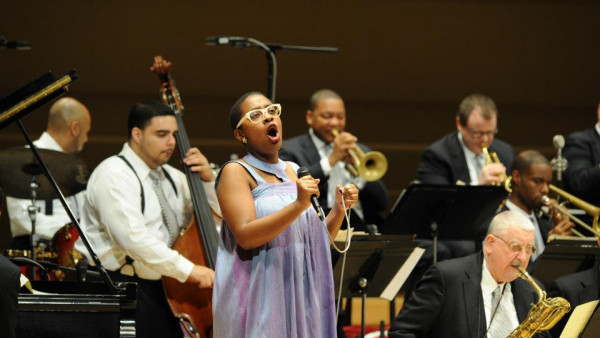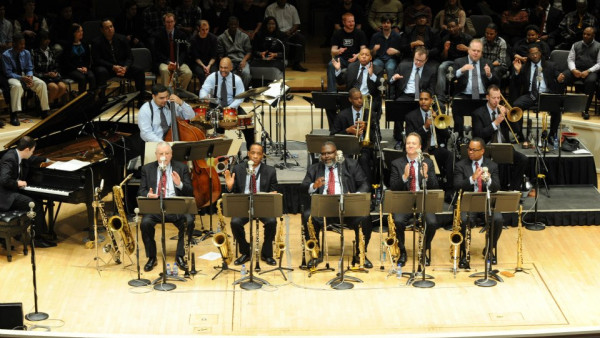Wynton Marsalis heads to Symphony Center for weekend residency
For most of us, turning 50 represents a major personal landmark.
For Wynton Marsalis, it’s inevitably a public occasion, if only because for at least two decades he has been the world’s most widely recognized jazz artist. As composer, trumpeter and artistic director of Jazz at Lincoln Center – and leader of its eponymous, perpetually touring orchestra – Marsalis holds an outsize position in American musical culture.
That he recently became a cultural correspondent for CBS television only has heightened his profile.
So what does turning 50 (last October) mean to him?
“That means you’re not 49,” says Marsalis, with a laugh, as he prepares to launch a three-concert residency with the Jazz at Lincoln Center Orchestra starting Friday night at Symphony Center.
The first concert, “Wynton Marsalis at 50,” will survey highlights of the repertoire he has written for the JALC Orchestra, with excerpts from sprawling works such as his “Vitoria Suite” and “Congo Square.” A “Jazz for Young People” concert on Saturday afternoon (followed by Q-and-A with Marsalis) and a “Big Band Hits” show featuring vocalists Natalie Cole and Cecile McLorin Salvant on Saturday evening will close out the engagement.
“I feel young,” continues Marsalis. “For me, (being 50) just means that you’re grown.
“Being 50 means you have long friendships and you have known people for years,” adds Marsalis, specifically citing Jim Fahey, the director of programming at Symphony Center Presents who has curated JALC’s visits to Orchestra Hall.
“You start to realize, this is your life, these are the people you’re living with, and you accept each other a certain way, and you treasure each other more, because you don’t always think something else is going to happen.
“Part of being 50 is you distill a lot of your experiences. As you get older, you start to realize: This is what I am.
“You don’t keep thinking that you’re going to wake up and be something else, or something else is going to happen. You have a certain gravitas that comes with the acceptance of what you have done.”
Certainly Marsalis has done quite a bit. Twenty-five years ago, he and colleagues founded Jazz at Lincoln Center, today the leading jazz presenting organization in the country. Its gleaming, $128 million complex at Broadway and 60th Street in Manhattan presents music in various performance spaces close to 365 nights a year. Its “Essentially Ellington” High School Jazz Band Program includes a contest that attracts bands from across the country, thereby stoking interest in jazz among those who need exposure to the music most: students. And its resident ensemble, the JALC Orchestra, has no serious rival among touring large ensembles, if only because JALC stays in fighting form with a relentless performance schedule.
Yet this is a time of transition for Jazz at Lincoln Center, with the recently announced resignation of board chairman Lisa Schiff, who held that spot since 2001 and will be turning over the keys to Robert J. Appel; and the departure of Adrian Ellis as executive director in January (his successor will be named this week).
“Ten years is a long time,” Schiff told the New York Times last week in explaining her exit. “I’m tired.”
Marsalis considers Schiff’s move “a loss for us,” he says. “But she’s staying (involved) with the organization, and she’s dedicated to it, and it actually has made us refocus what we’re doing, and it has brought us closer together as an institution.
“But she did such an unbelievable job in the most difficult of times, through 9-11 and through all these other things. … I wish I could write a book on all that this woman did. Maybe one day I will.”
Marsalis considers the turnover “growing pains” of a multi-faceted performance-and-education jazz organization that has no real precedent in America. Indeed, to this day, only one somewhat comparable American institution exists, the smaller-scaled but equally treasured SFJAZZ in San Francisco, which will open its own state-of-the-art performance center early next year.
Looking ahead, Marsalis sees JALC working to release its voluminous archives of recorded performances; putting a wide range of jazz educational activities and curricula online; and developing a summer camp for students.
Apart from Marsalis’ jazz activism, however, his compositions stand at the core of his art. In this regard, he says he’s working on “cleaning up the Blues Symphony” that he premiered with the Atlanta Symphony Orchestra in 2010; and composing another movement for the “Swing Symphony” that the Berlin Philharmonic premiered that year.
He also yearns to write a string quartet in memory of Irene Diamond, a Jazz at Lincoln Center philanthropist who died in 2003 at age 92. “It’s always in my mind to write this string quartet for her, because I really loved her,” says Marsalis.
Most tantalizingly, Marsalis says he hopes to compose a series of four operas on the Civil War.
“That’s the thing I really want to do with these years,” explains Marsalis, who adds that a previously announced operatic collaboration with the playwright John Guare did not work out.
“I figure it’s going to take me maybe 10 or 15 years to write them, so that’s kind of what I’m pointing toward.”
Marsalis expects to pen the librettos himself, not such a surprise, considering that he created the text for his “Blood on the Fields” and other major works and has written several books.
“I think I’m going to have to write it, because it’s a specific story I want to tell. It’s going to have a lot of what I perceive to be the American mythology, kind of the American archetype.”
Next season, Jazz at Lincoln Center will revive one of Marsalis’ most ambitious pieces, the evening-length vocal-instrumental suite “Blood on the Fields,” which won the 1997 Pulitzer Prize for music, the first jazz composition to do so (I served on the jury that unanimously recommended the piece for this honor).
“It wasn’t really even my choice,” says Marsalis, about the “Blood on the Fields” revival. “We have a whole team (at Lincoln Center) that talked about it. They said, ‘You’ve got to do that, because it’s a definitive moment in our program.’
“It just means something to our organization, and also the story of it,” says Marsalis, referring to a tale of a man and a woman set against the madness and inhumanity of slavery.
Here’s hoping JALC takes the piece on at least a limited tour. It deserves to be heard again, far beyond the borders of Manhattan.
by Howard Reich
Source: Chicago Tribune


